 Petzlover
Petzlover Cao da Serra de Aires is originated from Portugal but Maremma Sheepdog is originated from Italy. Cao da Serra de Aires may grow 18 cm / 7 inches shorter than Maremma Sheepdog. Cao da Serra de Aires may weigh 18 kg / 39 pounds lesser than Maremma Sheepdog. Both Cao da Serra de Aires and Maremma Sheepdog has almost same life span. Cao da Serra de Aires may have less litter size than Maremma Sheepdog. Both Cao da Serra de Aires and Maremma Sheepdog requires Moderate Maintenance.
Cao da Serra de Aires is originated from Portugal but Maremma Sheepdog is originated from Italy. Cao da Serra de Aires may grow 18 cm / 7 inches shorter than Maremma Sheepdog. Cao da Serra de Aires may weigh 18 kg / 39 pounds lesser than Maremma Sheepdog. Both Cao da Serra de Aires and Maremma Sheepdog has almost same life span. Cao da Serra de Aires may have less litter size than Maremma Sheepdog. Both Cao da Serra de Aires and Maremma Sheepdog requires Moderate Maintenance.
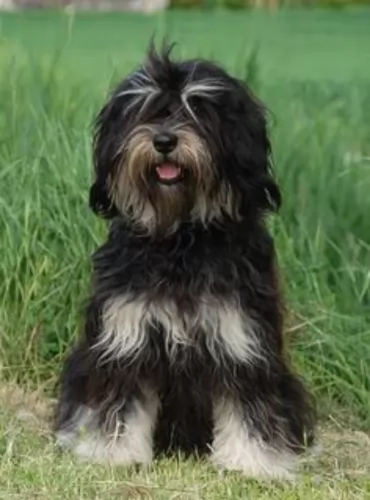 Ancestors of the Cao da Sera de Aires were used for herding livestock in the Serra de Aires and Alentejo, Portugal. This herding dog is native to Portugal and throughout the 20th Century he was kept as a working dog.
Ancestors of the Cao da Sera de Aires were used for herding livestock in the Serra de Aires and Alentejo, Portugal. This herding dog is native to Portugal and throughout the 20th Century he was kept as a working dog.
Known also as the Portuguese Sheepdog, Portuguese Shepherd Dog or Serra de Aires Mountain Dog, there are some questions surrounding the breed's ancestry as there are few records of dogs before 1900. The dog is thought to be related to the Pyrenean and Catalan Sheepdogs and that it has descended from Briards which were imported into Portugal and crossed with the Pyrenean Sheepdog.
The Cão da Serra de Aires breed standard was accepted by the Portuguese Kennel Club, and the breed was recognized internationally in 1996. The dog was also recognized by the United Kennel Club in the Herding Group in 2006.
 Known also as the Cane de Pastore Maremmano-Abruzzese, the Maremma Sheepdog is often referred to as the Maremmano or the Abruzzese Sheepdog.
Known also as the Cane de Pastore Maremmano-Abruzzese, the Maremma Sheepdog is often referred to as the Maremmano or the Abruzzese Sheepdog.
This is a working dog – a guardian of sheep and an indigenous dog to central Italy. The dog has been used for centuries already to guard sheep.
It was in 1924 that the first standard for the breed was published.
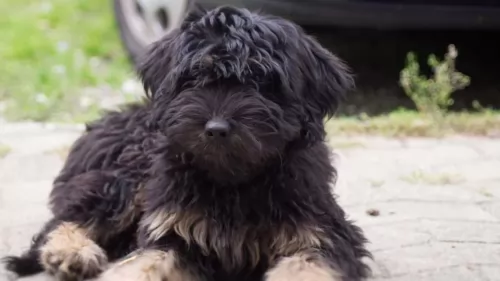 The beautiful Cão da Serra de Aires is a medium-sized dog. He stands at 45 to 55 cm at the withers and weighs about 17 to 27 kg. He is recognizable by the long, shaggy, single-layer coat, of straight or slightly wavy hair. Don’t be deceived by the coat as below, the dog has a muscular, athletic body.
The beautiful Cão da Serra de Aires is a medium-sized dog. He stands at 45 to 55 cm at the withers and weighs about 17 to 27 kg. He is recognizable by the long, shaggy, single-layer coat, of straight or slightly wavy hair. Don’t be deceived by the coat as below, the dog has a muscular, athletic body.
The coat comes in different shades such as fawn, gray, yellow and black. The dog has a long tail which is held straight out or down and he has medium-length, floppy ears. You’ve got to look hard, as the facial features of the dog are hidden by its shaggy coat. He has a lot of facial hair that sometimes you have to wonder if he can see out of his eyes.
The Cao da Serra de Aires is a wonderful canine companion and is devoted and loyal, forming strong bonds with their human family. He is a playful, amicable dog and gets on well with children in the home as well as with other pets.
He is intelligent and trainable, and when properly trained and socialized,he becomes an even nicer pet to have around and is obedient to his master’s voice. He is territorial, strong willed and dominant and makes a good watchdog too.
 The Maremma Sheepdog is a large dog with a muscular build. Some people who have owned these distinctive-looking dogs say he is like a big bear. He stands at 65 to 73 cm in height, both male and female, and he weighs 35 to 45 kg.
The Maremma Sheepdog is a large dog with a muscular build. Some people who have owned these distinctive-looking dogs say he is like a big bear. He stands at 65 to 73 cm in height, both male and female, and he weighs 35 to 45 kg.
The coat is long, thick and white with a dense undercoat. If you look you’ll see flashes of pale orange or apricot amid the white. There is thicker, longer hair around the neck area.
The nose is black, the eyes brown and the ears medium length and floppy. The long tail is set low and is thickly feathered. You can expect 6 – 10 puppies from these dogs.
The Maremma has always been used to guarding sheep, and today even though he is looked upon as a wonderful, friendly companion dog, he also makes an excellent watch dog, being brave and courageous. He isn’t the kind of dog that you think of as getting wildly excited over something, as he has a dignified aura about him.
He is an independent dog, so training and sociaization will be absolutely imperative as he is strong-willed and likes to do things his way. Once trained and socialized, it is amazing to see such a large dog obeying all your commands such as ‘lie down, come, sit an stay'. He is very intelligent and shouldn’t have any trouble learning these basic commands.
He is calm and gets on well with children as well as other pets in the home. With his role as guardian of sheep, he has learned to be loyal and patient and will make a loyal ad loving family pet he takes his role as guardian very seriously.
He loves hard work, and shepherds have always appreciated the splendid work he does guarding their flocks. As a companion you will also appreciate the many excellent qualities he possesses.
The Maremma Sheepdog isn’t recommended for life in the city where there is a tiny garden. He has always been accustomed to large open spaces and requires a large garden. He won’t tolerate heat well with that thick coat of his and will require a shady spot in your garden to retreat to.
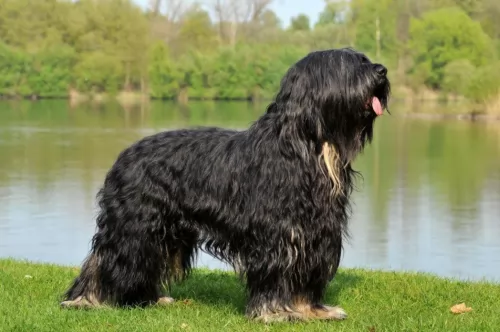 The Cão da Serra de Aires is such a loyal dog to his human family that he makes a splendid pet. He is active, having worked historically at herding and guarding.
The Cão da Serra de Aires is such a loyal dog to his human family that he makes a splendid pet. He is active, having worked historically at herding and guarding.
Socialization and obedience training ensure that he becomes an exceptional pet and he has a host of positive attributes to his name – he is intelligent, energetic, loyal and loving. He may have been used long ago to guard livestock, but today he is selected as a pet specifically for his excellent companionship and for his protective nature.
 This is a beautiful dog, but large, so don’t make the mistake of wanting a large dog like this for his looks. He will be expensive to feed.
This is a beautiful dog, but large, so don’t make the mistake of wanting a large dog like this for his looks. He will be expensive to feed.
If you have the means to provide a good home for him, he is friendly and good natured, even though he is strong-willed and independent.
Provide him with a good home and you’ll have a most splendid pet and companion.
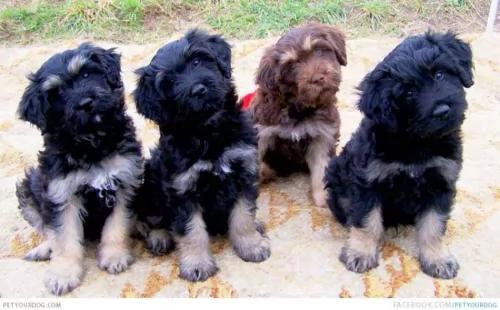 As with most dogs that are looked after well, their health can be good. The Cao da Serra de Aires isn’t likely to keep you at the vet often. Just like with any good dog, there are some health disorders that can benefit you to know about.
As with most dogs that are looked after well, their health can be good. The Cao da Serra de Aires isn’t likely to keep you at the vet often. Just like with any good dog, there are some health disorders that can benefit you to know about.
Being forewarned , you can get your pet to the vet quickly before the illness gets out of hand.
There are some pet owners who want to have their pets tested by the Orthopedic Foundation for Animals as well as the Canine Eye Registration Foundation to rule out health defects such as hip dysplasia and cataracts before they manifest themselves in their pets. This is of particular importance to breeders so as to prevent the parent dogs passing bad genetic conditions to the puppies.
This is a common skeletal disease where the dog’s hip joints don’t develop properly. It can be terribly painful for your pet to get around. It’s a genetic condition and while it is more prevalent in big dogs, any breeds are susceptible.
Your dog will battle along with painful joints and sometimes his hind-end will be lame. You’ll notice that once lying down, he battles to get up again. Fortunately vets are well acquainted with this ailment and they have different options to treat and manage it.
Cataracts in your dog come about from a disease process which affects the lens of the eye. The eye loses its transparency and impairs vision. There are some instances where cataracts can cause blindness. You’ll see a whitish gray area in your pets eye. The most common cause of cataracts is genetics. Get your pet to the vet who will do certain tests to evaluate the eyes and make a recommendation.
 This ancient dog breed is robust and can reach 11 to 13 years of age when cared for properly. Like any other dogs, he can be prone to certain health problems.
This ancient dog breed is robust and can reach 11 to 13 years of age when cared for properly. Like any other dogs, he can be prone to certain health problems.
One of these is hip dysplasia. Preventing your dog from becoming overweight can work towards preventing these kinds of musculoskeletal issues. Hip dysplasia occurs when your dog’s hip joints don’t develop properly so that the hips partially dislocate.
It is painful for your dog and it can be debilitating, leading to arthritis too and making it difficult for your pet to get around and to get up from lying down. There are a number of treatment options offered by your vet.
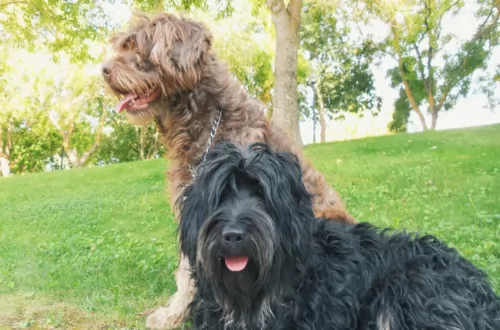 As a working dog used to long hours of action, the Cao da Serra de Aires will need lots of activity. He’ll need you taking him for long walks and playing ball games with him. He can become frustrated and destructive when left without any physical stimulation.
As a working dog used to long hours of action, the Cao da Serra de Aires will need lots of activity. He’ll need you taking him for long walks and playing ball games with him. He can become frustrated and destructive when left without any physical stimulation.
The Cao da Serra de Aires may have long hair but he isn’t high maintenance. He won’t require professional grooming, but will require a good brush a least twice a week. This is because the long coat can tangle.
To keep him looking his best, you’ll want to be trimming the hair around his paws. Another important grooming task is checking his ears and cleaning them. You have to be careful about cleaning your pet ears if you don’t know how, as it could damage the ears. Your vet can always advise you on how this is done.
 As already suggested, this large dog will need space and he will need to be exercised. Apart from long walks in he countryside or in the park or your neighborhood, he will also need other activities that stimulate him mentally and physically.
As already suggested, this large dog will need space and he will need to be exercised. Apart from long walks in he countryside or in the park or your neighborhood, he will also need other activities that stimulate him mentally and physically.
The thick, all-weather coat of the Maremma will need a thorough bushing at least twice a week to get rid of all those loose hairs. When you are brushing him, look around for signs of ticks and fleas too and run your hands over him to feel for any unusual lumps.
The Maremma is a large-breed dog, so before you get a big dog like this, decide whether you have the financial means to feed him and look after him properly. He is going to cost a lot to feed, so think it through first.
He will need to be fed a high-quality commercial dog food which has been specially formulated for a dog of his size. Keep the food of dogs simple. We’re all tempted to feed our dog treats like things such as chocolates, coffee, nuts, onions, grapes and raisins but these can cause havoc with your dog’s stomach.
Stick to simple, nutritious food. Boiled chicken, brown rice or pasta and vegetables such as potatoes, spinach and carrots can do wonders for your pet when you sometimes mix this into his kibble.
Try and mix some raw meat into his diet occasionally. Make sure he always has access to fresh, cool water.